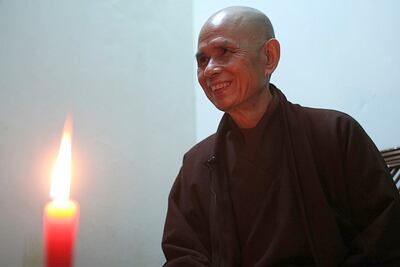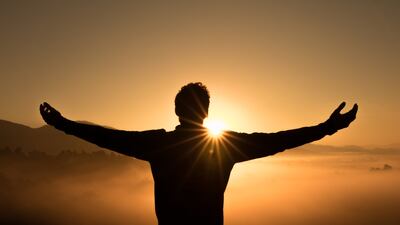In turbulent times, it can be hard to maintain a sense of self. As the winds of uncertainty blow our psychological ships to and fro, it becomes more important than ever to anchor ourselves to something real.
After all, living in the information age during a pandemic, bombarded with messages of climate change, conflict and economic uncertainty, it’s easy to get overwhelmed. There are always more things to be worried about, more things to be aware of and more things to fail to maintain control over.
During this time, meditation has been that anchor for me; a daily practice that keeps me tethered to my true self, to the present moment. It is a practice that calls me back any time I drift towards the brink of distraction, worry or fear.
And it is a discipline that trains our minds like a muscle, to return to our space of inner peace when we are pushed away from our centre — when someone cuts us off in traffic, when we receive bad news, in the face of crisis, for example.
Many people spend their entire lives under the illusion that if they just try hard enough, they can subjugate the external world to their will. This is described in many traditions as the primary cause of suffering.
Unless you’re a Targaryen, the real game is not about power and control, but surrendering the need to control what happens beyond, and focus instead on what lies within. Although we cannot control what happens around us, we can control how we respond internally to those changing external circumstances.

Of course, these are big ideas, which are hard to put into practice. For anyone who has never meditated, it can seem like a daunting, bewildering and insurmountable practice.
But it’s not about sitting in silence for weeks on end, starving beneath a Bodhi tree. At its simplest, it’s just about connecting with yourself, blocking out the noise and bringing your awareness to the present moment, even if just for a second.
The great spiritual teacher Ram Dass said: “Meditation is a way of listening more deeply, so you hear from a deeper space, exactly how it is. Meditation will help you quiet your mind, enhance your ability to be insightful and understanding and give you a sense of inner peace.”
But it is a discipline. When you first start meditating, as you take a moment to quiet your mind, the most shocking thing is realising just how many random, erratic and absurd thoughts are constantly bouncing around your mind.
Most people respond to this by trying in vain, once again, to exert their willpower; actively trying to fight away these thoughts, swatting them like flies off a sandwich.
But like flies, those thoughts will always return, and there will always be more of them.

Again, the key is to simply let go. Acknowledge the thoughts, don’t latch on to them, just observe and let them go. Imagine yourself sitting by a road, watching cars drive by. Each one of those cars is one of your thoughts. Just watch them zip past and disappear. They come and go, endlessly. Just becoming aware of them is the first step.
The simplest form of meditation is to simply breathe. To bring your awareness to your breath ― to the sensation of breathing in, pausing and breathing out. That’s it. When you find yourself pulled away from your centre by thoughts, dreams or fears, just come back to the breath.
Reflecting on this practice, the Buddhist teacher Thich Nhat Hanh said: "Our breathing is a stable solid ground that we can take refuge in. No matter what is going on inside us ― thoughts, emotions or perceptions ― our breathing is always with us, like a faithful friend.
“Whenever we are carried away by our thinking, when we are overwhelmed by strong emotions or when our minds are restless and dispersed, we can return to our breathing.”
The transformational power of the breath is really quite remarkable. Bringing awareness to the breath is tuning into the rhythm of life itself. Everything we do is a reflection of this biological process; giving, pausing, receiving.
Over many years, meditation has helped to make me a happier, calmer and more compassionate person. When we become more compassionate, we can then radiate that compassion outwards; once we connect with ourselves more deeply, we can connect with others more deeply. And in an unpredictable world, that is all we can really hope for.


